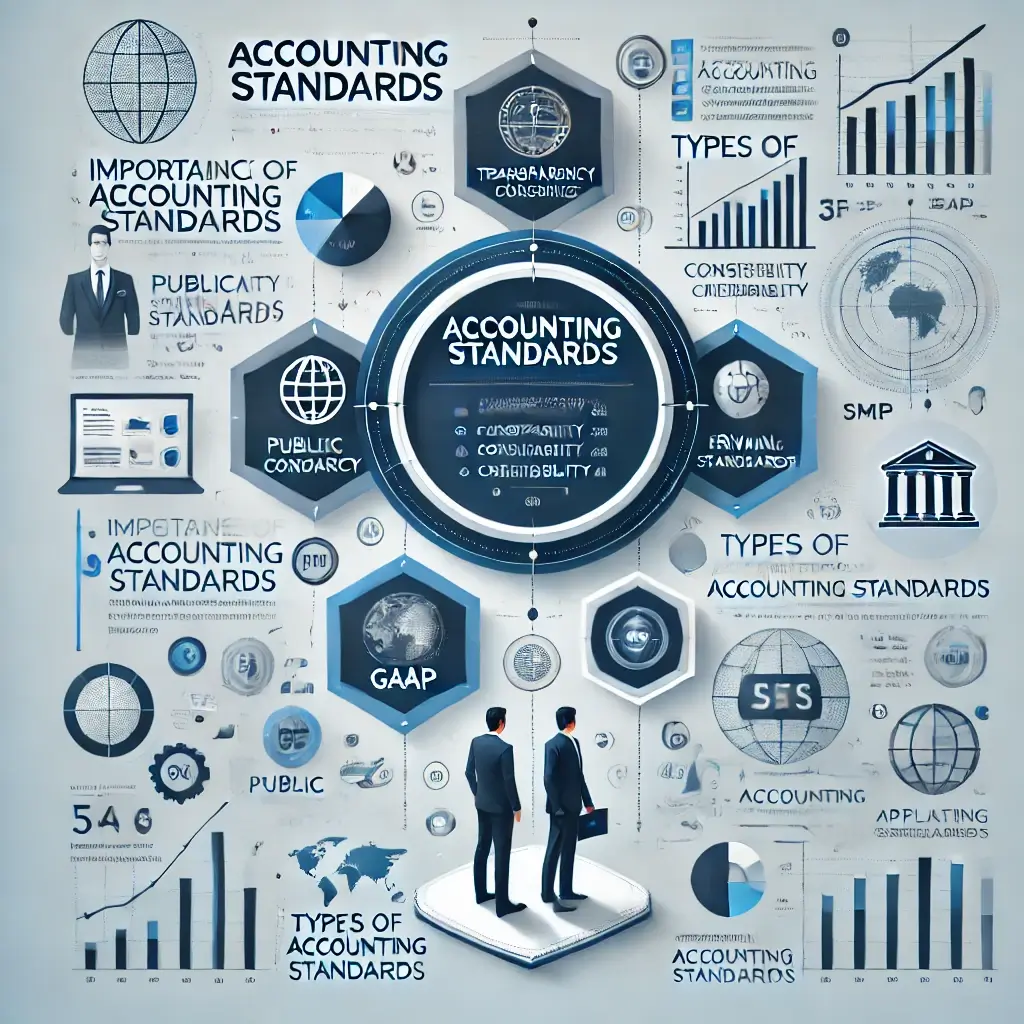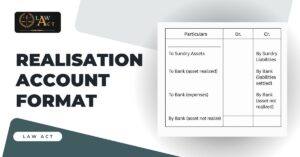Accounting standards are authoritative standards of financial reporting and are the main source of generally accepted accounting principles. They ensure transparency, comparability, and consistency in financial statements. They are very important to investors, regulators, and all other stakeholders who need financial reports for correct decision-making.
Importance of Accounting Standards
- Transparency: They ensure that companies clearly and truly present their financial health.
- Consistency: They bring uniformity and make it possible to compare the financial statements of different companies.
- Credibility: Compliance with known standards improves the credibility of the financial statements.
- Law Compliance: In many countries, companies are required by law to prepare their accounts as per specific accounting standards.

Types of Accounting Standards
International Financial Reporting Standards or IFRS
Issued by the International Accounting Standards Board, IFRS is designed to bring consistency to accounting language, practices, and statements across the world. They are used in over 140 countries.
Generally Accepted Accounting Principles
In the United States, GAAP is the accounting standard adopted by the U.S. Securities and Exchange Commission. GAAP includes principles on how to recognize, measure, present, and disclose items in financial statements.
Indian Accounting Standards
In India, Ind AS would be converged with IFRS so as to be compatible at international level and would be issued by the MCA.
Applicability of Accounting Standards
The applicability of a particular accounting standard would depend on factors like type of entity, size, whether listed or otherwise, etc.
For Publicly Listed Companies
Publicly listed companies must report financial statements in compliance with the country’s statutory body that is normally based on international standards of IFRS or GAAP.
For Private Companies
Private companies may be offered the option to apply the reduced complexity standard, which is less demanding than what is required by the publicly listed company. However, this is determined by the jurisdiction.
For SMEs
SMEs usually have requirements that are modified to address the smaller scale and non-complexity of such entities. For example, IFRS for SMEs represents a simplified version of the full IFRS that is targeted at SMEs’ needs and capabilities.
Table of Applicability
| Type of Entity | Primary Accounting Standards | Notes |
| Publicly Listed Companies | IFRS, GAAP, or relevant local standards | Must follow the strictest standards for transparency and investor protection. |
| Large Private Companies | GAAP, Ind AS, or relevant local standards | May have more flexibility but still need to provide reliable and consistent financial reporting. |
| Small and Medium Enterprises (SMEs) | IFRS for SMEs, local SME standards | Simplified standards tailored to the scale and complexity of SMEs. |
| Non-Profit Organizations | Specific NPO standards or GAAP | Standards ensure proper use of funds and transparent reporting to donors and stakeholders. |
| Government Entities | Governmental accounting standards | Often follow standards like IPSAS (International Public Sector Accounting Standards). |
Also Check:
- Who is the Final Approver of a Account BC Plan?
- Trade Expenses in Final Accounts
- Essential Accounting Standards for CA Inter Preparation
Key Accounting Standards and Their Applicability

IFRS 1: First-time Adoption of IFRS
Applicability: This standard is applicable to entities adopting IFRS for the first time. It provides guidelines on how to make the transition from previous GAAP to IFRS.
Key Provisions:
- Mandatory use of IFRS in the first financial statements.
- Disclosure requirements for explaining the impact of the transition on financial position and performance.
IAS 16: Property, Plant, and Equipment
Applicability: Relevant to all entities that hold tangible assets for use in production, supply of goods, or for administrative purposes.
Key Provisions:
- Guidelines on the recognition of assets.
- Methods for measuring the carrying amounts.
- Rules for depreciation and impairment of assets.
IFRS 15: Revenue from Contracts with Customers
Applicability: Applicable to all entities entering into contracts with customers, except for leases, insurance contracts, and financial instruments.
Key Provisions:
- Five-step model for recognizing revenue.
- Detailed disclosure requirements to provide information about contracts with customers.
Challenges in Applying Accounting Standards
- Complexity: The detailed nature of standards can be difficult for smaller entities to implement without significant resources.
- Frequent Changes: Regular updates and changes to standards require continuous learning and adaptation.
- Global Differences: Variations in standards between different countries can pose challenges for multinational companies.
Benefits of Adhering to Accounting Standards
- Enhanced Comparability: Consistent standards allow investors and other stakeholders to compare financial statements across different companies and industries.
- Improved Decision-Making: Reliable financial information aids in making informed business decisions.
- Increased Credibility: Financial statements that comply with recognized standards are more likely to be trusted by investors, creditors, and other stakeholders.
- Regulatory Compliance: Following accounting standards ensures that entities comply with legal and regulatory requirements.
Conclusion
The applicability of accounting standards is a cornerstone of financial reporting. Whether for large publicly listed companies or small and medium enterprises, adhering to these standards ensures that financial statements are reliable, comparable, and transparent. Despite the challenges, the benefits of using recognized accounting standards far outweigh the difficulties, providing a solid foundation for the global business environment.
Also Read:
- Trade Expenses in Trial Balance
 Understanding financial terms is important for every business owner, student, or anyone interested in accounting. One such term is “Trade Expenses”, especially when it appears in the trial balance. This blog will explain what trade expenses are and what their presence in a trial balance means. We’ll keep the explanation simple and easy so even… Read more: Trade Expenses in Trial Balance
Understanding financial terms is important for every business owner, student, or anyone interested in accounting. One such term is “Trade Expenses”, especially when it appears in the trial balance. This blog will explain what trade expenses are and what their presence in a trial balance means. We’ll keep the explanation simple and easy so even… Read more: Trade Expenses in Trial Balance - Legal Charges in Final Accounts
 When preparing final accounts for a business, one important topic that often confuses people is legal charges. These charges are not just legal fees or penalties. They have a specific meaning in accounting and finance. In this blog, we will explain what legal charges are, why they are important, and how they are shown in… Read more: Legal Charges in Final Accounts
When preparing final accounts for a business, one important topic that often confuses people is legal charges. These charges are not just legal fees or penalties. They have a specific meaning in accounting and finance. In this blog, we will explain what legal charges are, why they are important, and how they are shown in… Read more: Legal Charges in Final Accounts - Realisation Account Format
 Management of finances is always a must in any business, regardless of how large or small the business might be. Among the key tools in accounting is the Realisation Account. It is especially used in the process of winding up or selling a business. But what is a realisation account exactly? And how do you… Read more: Realisation Account Format
Management of finances is always a must in any business, regardless of how large or small the business might be. Among the key tools in accounting is the Realisation Account. It is especially used in the process of winding up or selling a business. But what is a realisation account exactly? And how do you… Read more: Realisation Account Format - Motive Power in Final Accounts
 Motive power in final accounts refers to the expenses related to the energy or power needed to run the machinery and equipment. Besides, the manufacturing or production-related industries are usually where these costs are found. Motive power expenses can include costs such as: At the end of the financial year, we record motive expenses in… Read more: Motive Power in Final Accounts
Motive power in final accounts refers to the expenses related to the energy or power needed to run the machinery and equipment. Besides, the manufacturing or production-related industries are usually where these costs are found. Motive power expenses can include costs such as: At the end of the financial year, we record motive expenses in… Read more: Motive Power in Final Accounts - Common Final Accounts Problems and How to Solve Them
 Are you facing any final accounts problems? Then this blog is for you, here we will explain how you can solve those problems. By going through this article you can solve issues like incorrect trial balance, missing documentation, and many more, So let us get started. What are Final Accounts? At the end of the… Read more: Common Final Accounts Problems and How to Solve Them
Are you facing any final accounts problems? Then this blog is for you, here we will explain how you can solve those problems. By going through this article you can solve issues like incorrect trial balance, missing documentation, and many more, So let us get started. What are Final Accounts? At the end of the… Read more: Common Final Accounts Problems and How to Solve Them
Frequently asked questions
What are accounting standards and why are they important?
Accounting standards are the guides on financial reporting that ensure accuracy and consistency. They form part of any organization since they set a clear framework for companies to report financial data, hence making it easy for the stakeholders to understand and compare financial statements.
How do accounting standards impact financial reporting?
Accounting standards provide guidance to financial reporting through a structured approach to the capture and presentation of financial information, thus ensuring the consistency, reliability, and comparability of financial statements that stakeholders require for proper decision-making.
Who sets accounting standards in India?
Accounting standards in India are determined by the Ministry of Corporate Affairs and the Institute of Chartered Accountants of India. The MCA issues the Indian Accounting Standards, which are converged with the International Financial Reporting Standards.
What is the applicability of Ind AS for companies in India?
This is applied to all large and listed companies in India. Only those companies whose net worth will be more than a threshold limit and all listed companies need to prepare their financial statements as per Ind AS so that the same are comparable with global standards.
How do accounting standards differ from accounting principles?
Accounting standards are guidelines and rules that governments and organizations set as a basis for accounting and financial reporting. Accounting principles, on the other hand, point to broader concepts and theories that guide how accounting should be performed overall. Standards provide the detailed procedures, while principles describe the underlying ideas behind these procedures.
Are accounting standards mandatory for all businesses?
Accounting standards are mandatory for certain businesses, such as listed companies and large entities. This ensures transparency and consistency. Small businesses and private companies may, however, use the simplified standards, but compliance is usually a must for credibility and other legal reasons.
How often do accounting standards change?
Accounting standards are changed at times to accommodate new business practices and economic and regulatory needs. These changes may occur every year or as needed, and regular revision ensures the standards remain relevant and effective.
What are the consequences of not complying with accounting standards?
Non-compliance can be subject to legal penalties, financial loss, and loss of reputation. Due to non-compliance, the wrong presentation in financial statements misleads stakeholders and investors, hence resulting in mistrust and possible financial mismanagement.
How do accounting standards promote transparency in financial statements?
Accounting standards encourage transparency, which provides a clear platform for recording and reporting financial data. This allows the financial statements to be accurate, consistent, and comparable; hence, stakeholders can have an easy time understanding the financial health and performance of a company.
What role do accounting standards play in international business practices?
International business requires accounting standards because they provide a common framework for reporting. These standards enhance cross-border investments and trade by enabling the comparability of financial statements from one country to another, thereby improving the capability for cooperation in global economic matters.



